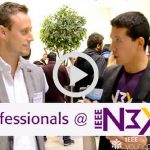2022 IEEE Presidents-Elect Candidates | IEEE Entrepreneurship Asks the Questions
IEEE Entrepreneurship asked the 2022 IEEE Presidents-elect candidates three questions to assist our entrepreneurial ecosystem in understanding their choices.
- Why do you think entrepreneurs are important to IEEE?
- What experiences have you had in your career with entrepreneurship, intrapreneurship, innovation, etc.?
- How would you, as IEEE President, support entrepreneurs?
IEEE’s 2022 Presidential Candidates, in which the order was pre-determined using a number generator, Saifur Rahman (Nominated by Petition), S.K. Ramesh (Nominated by IEEE Board of Directors), Thomas Coughlin (Nominated by Petition), and Francis Grosz (Nominated by IEEE Board of Directors) comment on how their respective candidacies will support entrepreneurs.
- The views and opinions expressed in this blog are those of each candidate and do not necessarily reflect the position of IEEE Entrepreneurship.
Saifur Rahman’s message to the IEEE Entrepreneurship community:
 From my long experience in teaching and keeping track of many former students who have entered the workforce and done well, I have seen two kinds of entrepreneurs. The first type is entrepreneurial (and usually innovative) from a young age, which may be from the high school level. When this young person starts college, they discover wide-open opportunities because college gives them a much broader view of life and access to information. They take advantage of this and build something marketable. Founders of Microsoft, Apple, Facebook, and Google are some of the shining examples.
From my long experience in teaching and keeping track of many former students who have entered the workforce and done well, I have seen two kinds of entrepreneurs. The first type is entrepreneurial (and usually innovative) from a young age, which may be from the high school level. When this young person starts college, they discover wide-open opportunities because college gives them a much broader view of life and access to information. They take advantage of this and build something marketable. Founders of Microsoft, Apple, Facebook, and Google are some of the shining examples.
In the second group larger in size are students who have a hidden entrepreneurial spirit but are risk-averse. With proper coaching and mentoring, some of them can be successful entrepreneurs. This is where IEEE can play a role. The IEEE Entrepreneurship community can be organized on university campuses like the IEEE Student Branches. The 2020 IEEE Entrepreneurship Survey – Table 1 shows that two-thirds or more of the respondents considered the following important: mentoring from entrepreneurial leaders, mentoring from investors, IP advice at lower cost, entrepreneurial workshops, and access to legal expert advice at a lower cost. There are intellectual property lawyers, angel investors, and successful entrepreneurs who may be invited to campus events and encouraged to provide some pro-bono services to help entrepreneurs on college campuses. These activities can help IEEE not only to find entrepreneurs but also to help them succeed. For IEEE to grow and succeed globally, the organization needs to be relevant to students and working technologists worldwide. The IEEE Entrepreneurship Program can be a way to do this.
My own experience
I have set up a start-up company BEM Controls, LLC, which provides an open architecture software platform to monitor and control a range of IoT devices for building automation, power management, energy efficiency, and so on. It is considered an academic research start-up. The origin was a government-funded research project at my university.
As IEEE president I can support entrepreneurs in the following ways.
- Work with local startup incubators to harness entrepreneurial potential.
- Incubate Innovation Centers to nurture Maker competencies.
- Develop IEEE Startup Shows to highlight regional/local innovations.
- Intellectual property rights (IPRs) awareness-building
- Develop an IEEE IPRs skills development framework
- Develop key performance indicators (KPIs) for Regions/Sections on local IPRs activities such that we can reward the best-performing ones
S.K. Ramesh’s message to the IEEE Entrepreneurship community:
 I am delighted to share my thoughts with you as a candidate nominated by the IEEE Board of Directors for the position of 2022 President-Elect. The pandemic and its aftermath is a stark reminder of our fragility, and it will take innovative solutions to address the global challenges that confront us, whether it is climate change or health care. IEEE’s mission – “Advancing Technology for Humanity” – has never been more relevant. Technologies are changing. Challenges are evolving. Our members’ experience has changed. We need to adapt and change to serve our members effectively. IEEE Entrepreneurship is exactly what we need!
I am delighted to share my thoughts with you as a candidate nominated by the IEEE Board of Directors for the position of 2022 President-Elect. The pandemic and its aftermath is a stark reminder of our fragility, and it will take innovative solutions to address the global challenges that confront us, whether it is climate change or health care. IEEE’s mission – “Advancing Technology for Humanity” – has never been more relevant. Technologies are changing. Challenges are evolving. Our members’ experience has changed. We need to adapt and change to serve our members effectively. IEEE Entrepreneurship is exactly what we need!
Innovation will be the driver of human success as I have learned from the virtual town halls that I have hosted over the past year. The necessary skill sets for future jobs include strong communications, teamwork, systems thinking, and an inclusive entrepreneurial mindset. They are significantly different and more complex than in the past. IEEE can help in a big way. My goals are to support IEEE members worldwide through industry-focused workshops and conferences, enhance continuing education and retraining programs, proactively engage volunteers, and strengthen connections with industry through IEEE Entrepreneurship.
As an engineering educator, I have established programs and centers that build entrepreneurial ecosystems focusing on renewable energy, assistive technologies, and advanced manufacturing. This includes a satellite incubator at CSU Northridge in 2011 in collaboration with the LA Clean Tech Incubator initiative (LACI). This led to startups in clean technologies, resulting in projects like Ecoponex. By 2014, LACI companies created over 700 jobs and US$60 million in revenues. A post-pandemic world needs sustainable programs that are outward-focused entrepreneurial engines of innovation.
My IEEE experiences of almost four decades have taught me some timeless values: To be Inclusive, Collaborative, Accountable, Resilient, and Ethical. Simply put, “I CARE.” Collaboration is built on a foundation of trust and transparency, and these are non-negotiable values as far as I am concerned. I see IEEE Entrepreneurship as the platform that enables us all to be resilient, innovate in the face of adversity, and create a bright and sustainable future for humanity. Let us ‘Engineer the Future’ together and create an IEEE “Of the members”, “By the members”, and “For the members”. Please visit https://rameshsk.com for additional information. Thank you for your support!
Tom Coughlin’s message to the IEEE Entrepreneurship community:
As an entrepreneur and as a member of IEEE’s Entrepreneurship Community, I am glad to talk about the importance of entrepreneurship to the IEEE, my own entrepreneur experience, and how, as IEEE President, I will support entrepreneurship.
 First, a bit about my own entrepreneurship and how IEEE has helped me. I have worked in the digital storage and memory industry for over 40 years, many of those years in Silicon Valley. In 1999 I went on my own, and since then I founded and organized large annual conferences focused on digital storage and memory and their applications. I also write and sell reports on digital storage and memory.
First, a bit about my own entrepreneurship and how IEEE has helped me. I have worked in the digital storage and memory industry for over 40 years, many of those years in Silicon Valley. In 1999 I went on my own, and since then I founded and organized large annual conferences focused on digital storage and memory and their applications. I also write and sell reports on digital storage and memory.
IEEE has been a great forum to build my personal brand and to create a valuable personal network.
I have been a member of the IEEE Industry Engagement Committee and currently Chair an IEC careers WG.
The organization that became the IEEE was founded by technology entrepreneurs, and technology-oriented industries were strong supporters of the IEEE. But IEEE has lost a significant percentage of its industry members over the last 20 years. This loss of industry members reflects changes in the engineering profession, the companies that employ engineers, and the ability of the IEEE to provide value to these companies and their employees.
Re-establishing IEEE’s connections to industry and especially to those who start their own businesses is crucial for the future of the IEEE. During their careers, many IEEE members will run their own businesses, and a strong IEEE Entrepreneurship program will be important to support these members. Improving our ties to industry, and providing value to our members in industry, especially our entrepreneurs, is a major goal I will pursue as President.
Here are some ideas that I think can help. We should establish local section entrepreneurship communities (perhaps as ad hoc section local groups) and work with regional and societal entrepreneur programs. In addition to organizing their own activities, these local groups can work with IEEE Entrepreneurship to provide entrepreneurship training and mentoring targeted at local universities and student branches.
Some other ideas that could increase IEEE’s value to entrepreneurs and industry include: developing advanced AI-based knowledge services, virtual and hybrid events focused on industry and entrepreneurship, engaging with industry on Future Directions activities such as technology road maps, and creating initiatives with industry trade groups.
Francis Grosz’s message to the IEEE Entrepreneurship community:
 Having been a founder of a company myself, I understand the problems you face in doing this. When I was an undergraduate, the normal course for engineers was to go to work for a large company and retire from it 40 or 50 years later. This has not been the case for several decades, and today many engineers prefer to chart their own course and develop their own ideas.
Having been a founder of a company myself, I understand the problems you face in doing this. When I was an undergraduate, the normal course for engineers was to go to work for a large company and retire from it 40 or 50 years later. This has not been the case for several decades, and today many engineers prefer to chart their own course and develop their own ideas.
IEEE has several tools available to help entrepreneurs. One of the most exciting is the recent development of the Local Groups concept. IEEE Member and Geographic Activities (MGA) is currently running a Local groups pilot.
This allows Sections or Regions, in a low bureaucracy, low overhead way, to create groups on topics of interest to their members. These groups do not have to be on technical subjects, and non-members of IEEE can belong to the Local Group. All it takes to start one is two IEEE members, one of whom must be a voting member, and the permission of the Section or Region. If there are several people in your area interested in entrepreneurship, consider this. Members can share information and ideas, and you are stronger together than separately. Other tools include IEEE Entrepreneurship, IEEE Collabratec, the IEEE App, and more.
The world is changing more rapidly than ever before. The pandemic only accelerated this. Smaller companies, led by dynamic and creative technology-savvy people, can be far more flexible and better able to respond to these changes than a larger organization can, particularly in areas where the technology is changing especially rapidly. Companies focused on technology used to be led by engineers and technologists; today finance or business majors lead them. To people who say engineers don’t make good company leaders I have a two-word answer: Hewlett-Packard (back when Bill and Dave ran it). Or even a one-word answer: Intel. Not all new enterprises will succeed; few will do as well as these. But you will not know if you don’t try. Or, as John Greenleaf Whittier put it, “For of all sad words of tongue or pen, the saddest are these: ‘It might have been!'” Whatever you do, today people realize that they are in charge of their lives and careers. You chart your own course in life, so find your own star and follow it.
My best wishes to you all!






